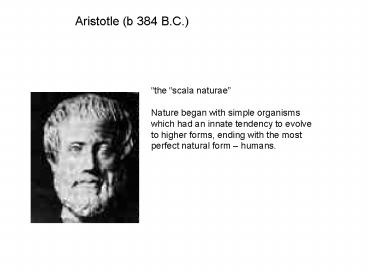Aristotle b 384 B'C' - PowerPoint PPT Presentation
1 / 14
Title:
Aristotle b 384 B'C'
Description:
Galileo came into conflict with the church and government because he believed in ... he was mainly a physicist, he commented on fossils and believed that they were ... – PowerPoint PPT presentation
Number of Views:24
Avg rating:3.0/5.0
Title: Aristotle b 384 B'C'
1
Aristotle (b 384 B.C.)
the scala naturae Nature began with simple
organisms which had an innate tendency to evolve
to higher forms, ending with the most perfect
natural form humans.
2
Galileo (early 1600s)
Galileo came into conflict with the church and
government because he believed in learning by
experiment and observation. Although he was
mainly a physicist, he commented on fossils and
believed that they were the remains of former
living things, now extinct.
Galileo was tried for heresy because he taught
his students that the Earth revolved around the
sun.
3
Bishop Ussher (early 1600s)
Bishop Ussher was the Bishop of Armagh in
Ireland. He was a highly respected scholar, an
expert translator of ancient languages, and a
famous teacher. At the end of his life he
focused his efforts on creating a chronology
based on the Biblical accounts of the history of
the Earth. This was completed after his death by
his students, and was routinely published as part
of the supplemental material in many 18th and
19th century Bibles. According to Bishop Ussher
the world was created on Oct 23rd, 4004 B.C. and
Noahs Flood ended on May 5th, 1491 B.C.
4
Buffon (mid 1700s)
George Leclerc, Count Buffon, used his wealth and
status to create a true biological experimental
station The Garden of the King in Paris. He
came into conflict with religious authorities
because his biological studies led him to believe
that the Earth was hundreds of thousands of years
old, conflicting with the churchs view that the
Earth had been formed about 4004 B.C. Like
Galileo, Buffon exemplifies the idea of science
that we must learn about things by examining
them, observing, measuring, counting, analyzing
that our knowledge is never perfect. We must
always be trying to improve and make our
understanding better.
5
James Hutton (late 1700s)
Although Hutton was famously inept as an
explainer and teacher, his long association with
the University of Edinburgh meant that his
university friends were familiar with Huttons
ideas. After his death John Playfair, a very
distinguished teacher and researcher in
mathematics, rewrote Huttons books and explained
his ideas to the world. Huttons main idea,
Uniformitarianism, became one of the fundamental
theories of modern Geology.
6
Uniformitarianism
- In the 1700s people were fond of giving elaborate
names to their theories the name
Uniformitarianism refers to the idea that - the same uniform forces that shape the world
today, have shaped it in the past, and will shape
it in the future.
Volcanic eruption in Italy
7
Hutton
Huttons ideas would not have been accepted if
they were just ideas. But he gave specific
examples of what he meant. Observations that came
from nature, not just things he imagined. And the
things he described could be found anywhere, not
just in the places he mentioned. His ideas were
based on observation, and were universal
8
(No Transcript)
9
(No Transcript)
10
(No Transcript)
11
(No Transcript)
12
William Smith Smith earned the nickname Strata
because of his discovery that rocks are arranged
in distinct layers (strata) that can be
recognized and identified by the fossils they
contain. He noticed that the fossils are
segregated and occur in the same sequences over
and over in different areas of the country
When he produced a map showing his discovery it
had a HUGE impact on geology
13
Charles Lyell
Lyell was a Scot, born in 1797, the year that
Hutton died, only a few miles away from Hutton.
Raised in England, he was introduced to the work
of William Smith. Starting about 1830, Lyell
produced a major textbook Principles of Geology
which was THE book for geology for almost the
whole of the 19th century it went through 13
revisions and was the basic text for geology
classes in virtually every school in the world.
The book had a huge impact on how modern
science understands the Earth
14
Sci 3010 Environmental Science
- Evolution the descent with change through time
of living organisms. - Natural Selection the mechanism by which species
evolve - Charles Darwin was the first person to
convincingly explain the idea of Natural
Selection in his 1859 book On the Origin of
Species by Means of Natural Selection.































